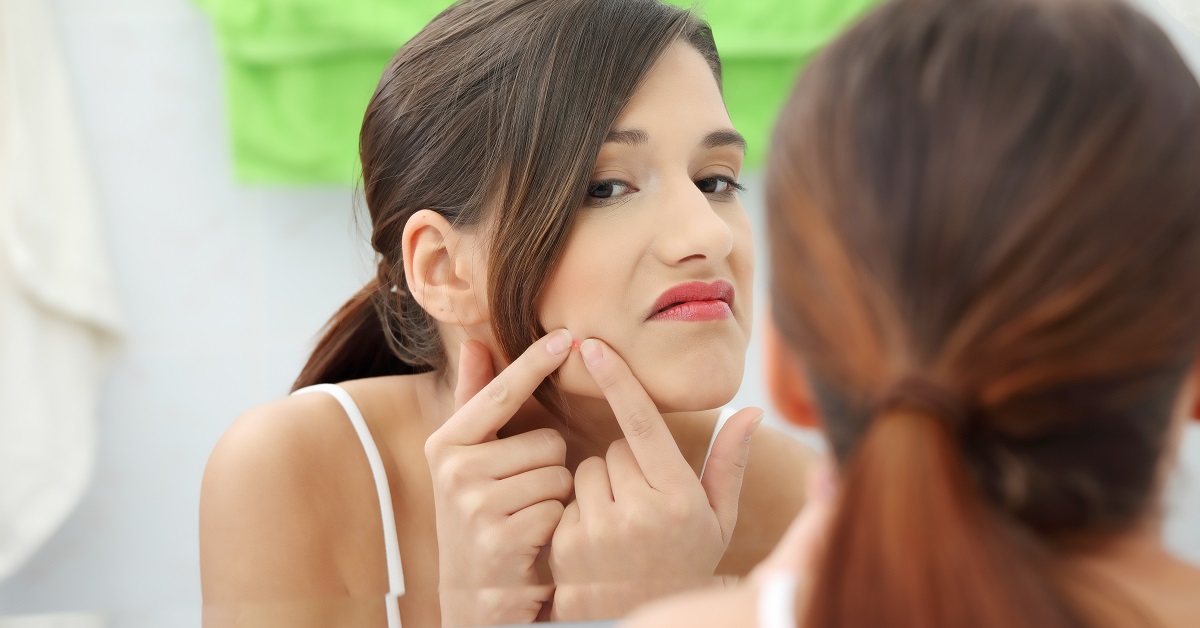By Ashley Patterson, M.D.
Board-Certified Dermatologist
Adult acne – it’s not just a teen problem. From occasional breakouts to persistent and chronic acne, it can be an issue that plagues adults just as much – if not more than – adolescents. In this article, we’ll answer the most frequent questions we receive about adult, specifically hormonal, and teen acne – from causes to treatments – and provide useful advice on how you can help control flare-ups regardless of your age or skin type. So, let’s take a deeper look into why acne occurs and how best to tackle it because you deserve unblemished skin at any age.
Q: What’s the difference between adult and teen acne?
As the name implies, teenage acne typically affects adolescent patients; however, it may start in kids as young as nine or ten. Adult (hormonal) acne, on the other hand, arises in the late 20s to 30s usually in female patients who had minimal acne as teenagers. With teen acne, we usually see it predominately on the forehead, cheeks, chest, and back. In contrast, adult hormonal acne tends to concentrate on the lower face such as the jawline and chin.
Q: Is teen acne worse?
Acne as a teenager is a normal part of adolescence. There are various treatment options and when care is obtained early and the proper treatment utilized appropriately, acne can be managed with minimal unwanted sequelae such as disfiguring scarring, post-inflammatory hyperpigmentation, and textural change.
Q: What triggers adult acne?
Adult (hormonal) acne can be triggered by increased sensitivity to testosterone or the presence of unopposed progesterone at the level of the hair follicle.
Other acne triggers include hair products, skin care products, and makeup, all of which can clog pores; and some medications, including topical corticosteroids, anabolic steroids, and lithium.
Q: Does every teen experience some sort of acne during puberty?
With puberty comes hormonal changes, yes, teens will experience some sort of acne during this time. Although the severity may vary from teenager to teenager, it is a normal part of the teenage experience.
Q: Is it possible for someone to have acne as an adult even though they did not have it during their teenage years?
It is possible to not have acne as a teenager but develop it later in life. Unfortunately, some adult acne can sometimes develop well into your 30s, 40s, and 50s.
Q: How does nutrition play a role in acne?
According to the American Academy of Dermatology, some studies found that low-glycemic diets may reduce the number and severity of acne lesions as diet can affect the levels of hormones involved in acne development. Increased dairy intake may worsen acne in young people living in countries with predominantly Western diets such as the U.S., U.K., and Australia.
Q: How is adult acne treated?
Adult (hormonal) acne can be treated with combined oral contraceptives containing both estrogen and progesterone, oral spironolactone, oral isotretinoin, oral antibiotics, topical clascoterone, topical antibiotics, and topical retinoids. A topical retinoid cream will help unclog pores and exfoliate the skin. Retinoids have some anti-inflammatory effects and promote increased skin turnover, which is helpful for expediting clearance of post-inflammatory pigmentation alteration.
Q: How is teen acne treated?
In addition to the above treatments, one of the most effective treatments you can get without a prescription is a benzoyl peroxide wash. These products help kill bacteria in the skin, unplug oil ducts, and heal pimples. There are many brands and varying strengths (4% up to 10%).
If stronger treatments are needed, your Board-Certified Dermatologist may prescribe a topical retinoid, such as Retin-A®; antibiotics in lotion, foam, gel, or pill form; or even oral isotretinoin.
Q: What products should teens stay away from?
For teens who wear makeup, I encourage them to use non-comedogenic makeup products, which means that the product will not clog their pores and thus worsen their acne. I also encourage them to not use exfoliating brushes, creams, and facial scrubs as the abrasive nature of these products can irritate the skin and thus worsen acne.
Q: When should I see a Dermatologist for my acne?
I recommend seeing a Dermatologist for evaluation and treatment of your acne at the first sign. The earlier a Dermatologist can intervene; the less likely acne goes unchecked which helps reduce the possibility of scarring and discoloration. It’s important to remember that when your Dermatologist recommends a specific plan (i.e., oral antibiotics, isotretinoin, oral contraceptives, combined oral and topical medication), there are certain features about your acne that likely he or she recognizes during the evaluation that warrants that level of intervention.
Some facets of acne, such as discoloration, may take a long time to get rid of once present, and scarring unfortunately is permanent. Hence, the goal of the treatment plan is to not only treat what is visible but also prevent those unwanted effects of acne or if those effects have occurred to prevent further progression. So, having an open mind and following the treatment recommendations can pay dividends in the long run to achieve the clear skin you want.
Q: How soon can I see the results after starting an acne treatment plan?
It depends on the intervention. On average, improvement usually takes three-to-four months after initiation of an acne treatment utilized as directed. I remind my patients with acne that much like many of their lesions did not appear overnight, likewise, the timeframe to see improvement will not be quick.
Q: Other tips for adults and teens dealing with acne.
Here are my top tips for dealing with acne:
- Avoid picking at your acne because it too can cause discoloration and scarring. While we have cosmetic treatments that can diminish the appearance of scarring, it will not ever look as though a scar did not exist.
- Do not sleep in makeup. Use makeup remover wipes and your face wash as any residue can cause an acne breakout.
- Acne treatments are not one-size-fits-all. They are customized to your skin and acne type.
- Seek medical care for your acne from a Board-Certified Dermatologist or an office with Dermatology Physician Assistants or Nurse Practitioners that work very closely with a Board-Certified Dermatologist. Avoid obtaining medical advice from a non-medical social media influencer because oftentimes, these influencers are paid to give positive reviews on skin care products. It’s best to discuss the addition of a new product to your treatment plan with your Provider beforehand.
Need Help with Acne?
If you are struggling with acne, then please reach out to us at MetroDerm. Our providers can offer you a consultation to review all your options and help you develop the best plan moving forward. Do not hesitate to book an appointment – we would be more than happy to help you achieve beautiful skin.
About the Author
Dr. Ashley Patterson is from Pensacola, Florida. She obtained her undergraduate degree at Howard University and worked for the Institute of Medicine in Washington, D.C., for three years before matriculating at Virginia Commonwealth University School of Medicine. Dr. Patterson completed a general surgery internship at Virginia Commonwealth University Health System and then pursued a two-year Dermatology Research Fellowship with the St. Louis University Department of Dermatology. She completed her Dermatology Residency at the St. Louis University Department of Dermatology in June 2021. Dr. Patterson is a Board-Certified Dermatologist and a fellow of the American Academy of Dermatology. She sees patients at our Atlanta and Alpharetta offices.
When not practicing medicine, she enjoys traveling, exercising, reading non-fiction, cooking, learning new languages, and spending time with family and friends.


